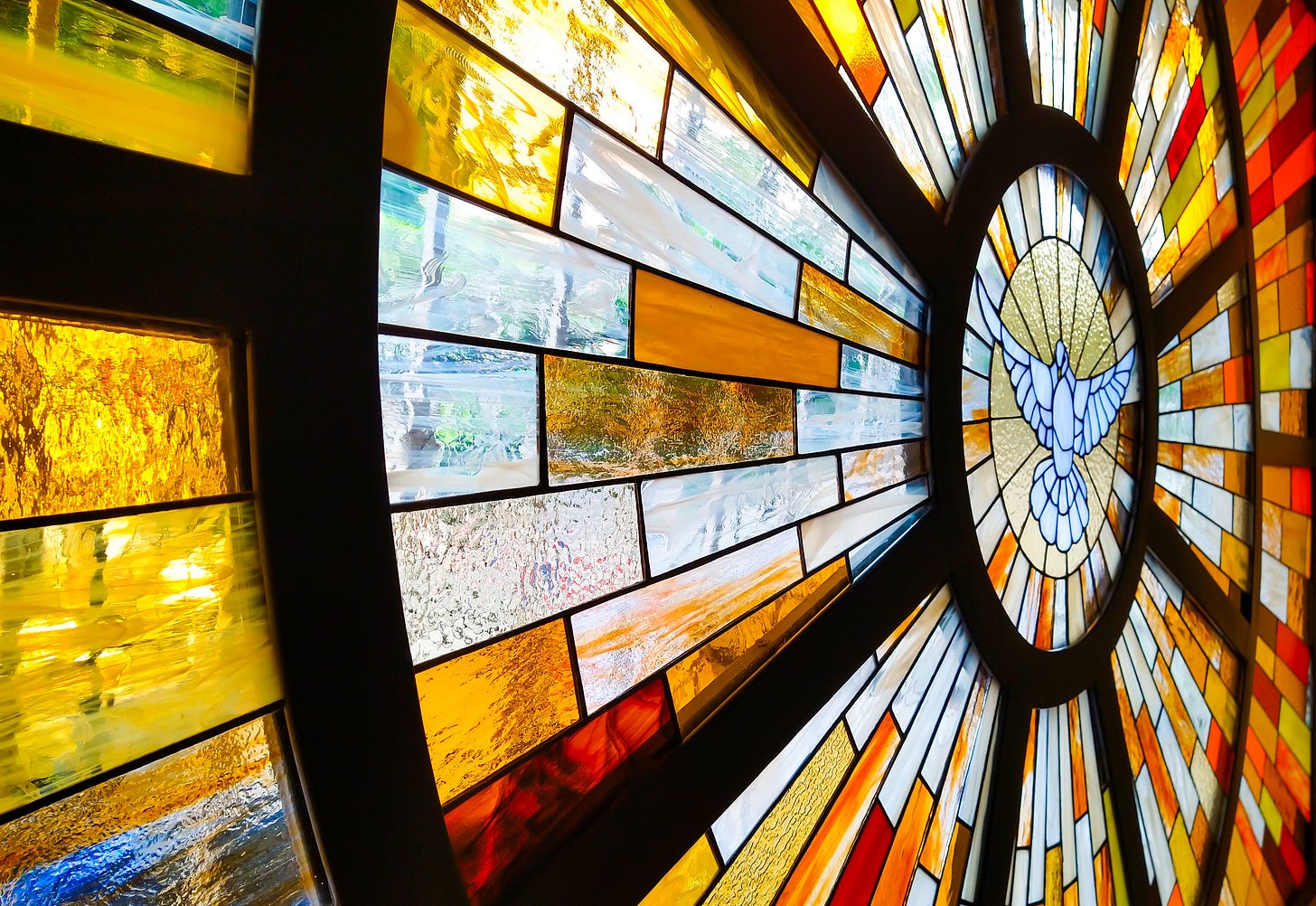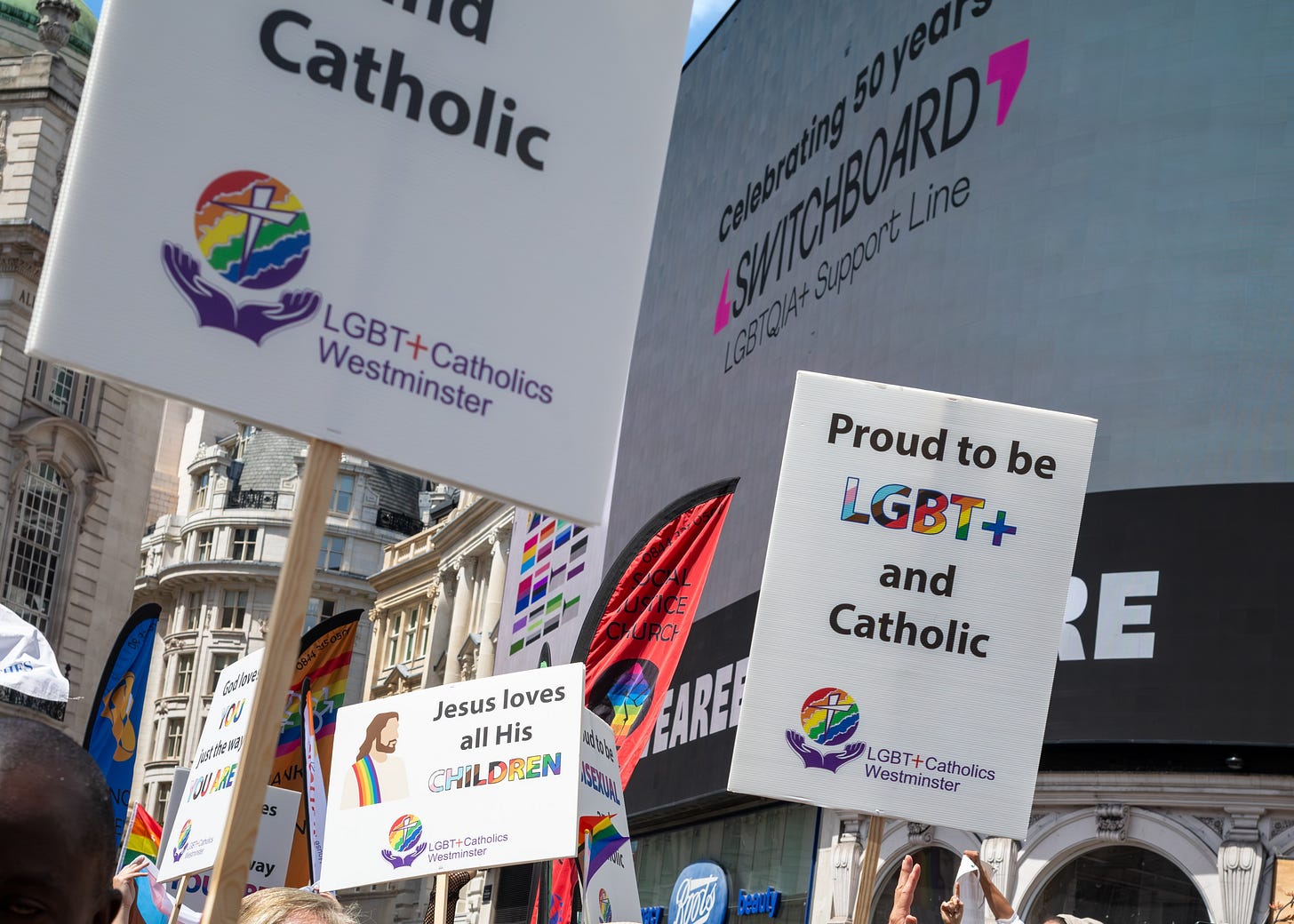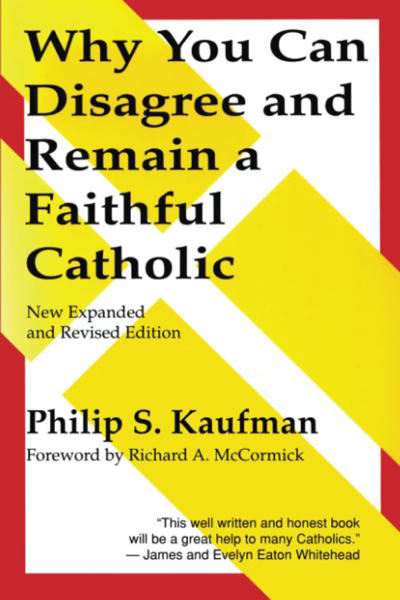Can You (Conscientiously) Disagree With Your Church?
The short answer is "yes" — but this question deserves a thoughtful response
Note: today’s post is very specifically about a question of Catholic faith and practice; but I believe the issues I explore: concerning conscientious disagreement with church doctrine, can be relevant to almost anyone in almost any faith community.
A reader writes:
Catholicism teaches that the LGBT lifestyle is sinful, so how do you reconcile that? I love Catholicism but there are certain things such as the ban on birth control. At the same time I've heard that the majority of Catholics in the USA use birth control. I get the impression that Catholicism is very rigid in this regard, so I'm wary of becoming Catholic. If you ever have the opportunity, I'd love to hear more about how liberal Catholics continue to be Catholic. I'm struggling to understand how that works.
Thanks for asking. These are important questions.
First, a brief note: being LGBTQ is not a “lifestyle” as if it were just a choice that some people make (like choosing to be a gardener or an athlete). Being gay, lesbian or bisexual; or transgender or nonbinary; or any of the various other categories of queer experience, is so much more than just a lifestyle choice. Do straight people or cisgender people casually “choose” their sexual or gender “lifestyle”? No, of course not. Most straight and cis people just simply recognize that’s who they are, and usually from a very early age. Queer folks have a similar deep and abiding knowing.
This is why, incidentally, both the mental health community and the queer community reject the idea that a person can be “cured” or “healed” from being gay or trans, as if queerness were just some sort of superficial problem to be solved. The evidence is pretty conclusive: attempts to cure/heal/change/convert queer people pretty much consistently leads to worse mental health outcomes, because this is not something that can be “treated” through prayer or “conversion therapy” or anything like that.
Now, to the main questions my reader is asking:
First, how can people who are queer, or queer allies, or simply queer-affirming and queer-accepting, engage with Catholic Christianity given that the Catholic Church teaches that homosexuality is “objectively disordered” and therefore that sexually expressive same-sex relationships are wrong?
Behind this is a larger question: how do people who conscientiously disagree with church teaching on any of a number of issues, like the use of contraceptives or the practices around marriage annulments, continue to remain practicing Catholics?
I think answering that second question can go a long way toward understanding the issues behind the first question.
In a way these are impossible questions to answer. By “impossible” I mean that there is no way I can answer these questions to everyone’s satisfaction. Some Catholics are so invested in equating “being a good Catholic” with “obeying every last detail of church teaching” that any attempt to look at conscientious dissent or disagreement with church teaching will immediately be met with scorn.
I would describe Catholics like that as fundamentalists — and I define that term as “anyone who insists that a narrow, rigid and legalistic interpretation of religious doctrine is necessary to be a member of the religion in good standing.”
But not all Catholics are fundamentalists. There is a long history of Catholic theologians and thinkers who have argued that it is necessary for a person to follow their conscience, even if it sometimes means disagreeing with church teaching. Of course, a view like this coud be easily abused: it’s not meant to be an invitation to “anything goes.” But the fact remains, that sometimes people of good will and careful discernment will disagree over important issues. The idea that following one’s conscience is more important than obeying doctrine is based on a good-faith understanding that we have a responsibility to form our conscience in a careful and mature way. And sometimes, good people disagree, even over important issues.
So here’s the question: when good people disagree, is it necessary to assume that only one party can be “right” and therefore the other party or parties must be “wrong”? That’s what a fundamentalist would argue. But it could also be argued that sometimes, even the Holy Spirit will slowly lead the community of faith (the church) into reform, by inspiring more and more faithful members of the church to see things in a new and different way.
It’s important to remember that once upon a time the Catholic Church taught that it was morally permissible to own slaves. And of course, we all know that the Catholic Church condemned Galileo for simply being a good astronomer and reporting evidence that the earth revolved around the sun (and not the other way around).
If the Catholic Church could get astronomy and slavery wrong, then isn’t it possible that the Catholic Church has gotten it wrong in regard to its teaching on gender and sexual diversity?
Again: fundamentalists will automatically insist that’s not possible. But most liberal Catholics, and even many moderate Catholics, might be willing to entertain the possibility.
I conscientiously believe that when religious leaders condemn queer gender or sexuality as “sinful,” they are speaking out of their ignorance of the science of human sexuality and gender. Just like Catholic theologians who argued in favor of slavery (some even in the 20th century!) were, I am convinced, ignorant of the economic and moral problems that slavery represent — and that the Catholics who condemned Galileo were ignorant of the plain evidence of scientific observation of the heavens.
So should I abandon the Catholic faith and Catholic spirituality? Well, that’s like asking if I should leave the American south because I disagree with the prevailing climate of ultra-conservative politics and the sorry history of Jim Crow racism. I am from the south and I still live in the south (in metro Atlanta), and I can love the south and strongly disagree with the prevailing political climate of this region. Similarly, I love Catholic spirituality and mysticism and will continue to do so, even thought I conscientiously disagree with Catholic teaching on a number of issues.
There are plenty of people who will say I’m a bad Catholic. They’re entitled to their opinion. But they don’t get to dictate where I worship. I also know priests and monks and nuns who hold opinions similar to mine (indeed, some who are way more liberal than I am, both politically and theologically!). So I am not alone.
Am I a heretic? Or am I being faithful to where I conscientiously believe the Holy Spirit is leading us, as a human family? Obviously, I believe the latter, and I am at peace with the fact that others will insist on the former. So be it.
Once again, I recognize that this is an impossible question to answer. For people reading this who find my answer offensive or disturbing, I am sorry that it bothers you. But I also know that some people will read what I’ve written and will agree with me, even if they do so quietly. Whether we like it or not, we live in a world where some people are liberal-minded and others are conservative-minded. I think we all need to be praying and discerning how we can learn to get along better. And perhaps the first step is for us to carefully practice the art of truly listening to each other.
If you want to dive deeper into this issue, I’d recommend the book Why You Can Disagree and Remain a Faithful Catholic by Benedictine monk Philip S. Kaufman. It’s a must read for anyone who would like to understand the theological principles behind conscientious dissent from official church teaching — without just abandoning the church.





